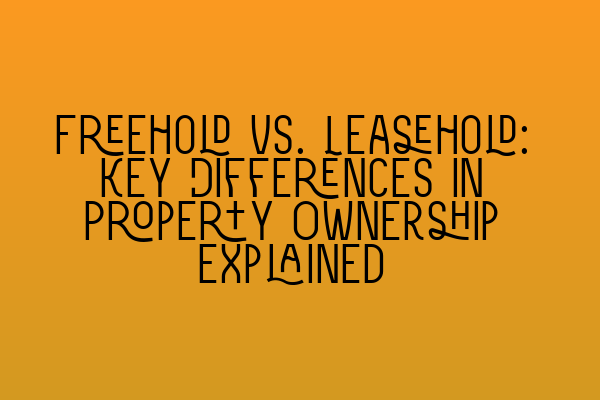Freehold vs. Leasehold: Key Differences in Property Ownership Explained
When it comes to property ownership in the United Kingdom, there are two main types: freehold and leasehold. Each type of ownership carries its own rights and responsibilities, and understanding these key differences is crucial for anyone involved in property transactions or disputes. In this article, we will explore the essential aspects of freehold and leasehold ownership, shedding light on the distinctive features of each.
Freehold Ownership
Freehold ownership is often seen as the ultimate form of property ownership. When you own a property freehold, you have complete ownership and control over both the land and the building on it. This means that you are the outright owner of the property and can enjoy it for an unlimited period of time.
One of the significant advantages of freehold ownership is the absence of any time restrictions. As a freeholder, you are not bound by leasehold terms or required to pay ground rent to a landlord. You have the freedom to make decisions about alterations and improvements without seeking permission from anyone else.
However, with great power comes great responsibility. As a freeholder, you are solely responsible for the maintenance and repairs of the property. You will need to ensure that the property adheres to all relevant building regulations and satisfy any planning permissions required for any changes you wish to make.
It’s also worth noting that as a freeholder, you have the authority to sell the property outright or pass it down to your heirs. This can provide long-term financial security and the ability to build generational wealth.
But what about leasehold ownership?
Leasehold Ownership
Leasehold ownership is a more common form of property ownership in the UK, especially for flats and apartments. When you own a leasehold property, you have the right to occupy and use the property for a fixed period of time, as specified in the lease agreement with the freeholder.
The lease agreement will typically outline the length of the lease, ground rent payable to the freeholder, and any other restrictions or obligations. It’s essential to carefully review the terms and conditions of the lease agreement before purchasing a leasehold property to ensure that they are acceptable to you.
While leasehold ownership provides the benefit of a lower purchase price or rental fee compared to freehold ownership, it also comes with certain limitations. As a leaseholder, you will have to seek permission from the freeholder for any significant alterations or improvements to the property. This can include anything from changing the layout or extending the property to replacing windows or installing new fixtures.
Leasehold ownership also means that you are subject to paying annual ground rent to the freeholder. The amount of ground rent varies depending on the terms of the lease agreement. In some cases, ground rent may increase over time, so it’s essential to consider this before entering into a leasehold arrangement.
It’s worth noting that leasehold ownership is inherently time-limited, and once the lease term expires, ownership of the property reverts to the freeholder. However, leaseholders may have the right to extend their lease or even purchase the freehold of the property through a process known as leasehold enfranchisement.
Conclusion
Understanding the differences between freehold and leasehold ownership is vital when navigating the complexities of property law in the United Kingdom. Whether you are buying, selling, or renting a property, knowing your rights and responsibilities as a freeholder or leaseholder is crucial.
If you require legal assistance or have any questions regarding property ownership, it’s always advisable to consult a qualified property law solicitor. At SQE Property Law & Land Law, we specialize in providing expert advice and professional representation for all aspects of property law. Contact us today to schedule a consultation and ensure a smooth property transaction.
Related Articles:
- Updates in UK Property Laws: Key Changes and Implications
- Legal challenges in property transactions: A comprehensive guide
- Navigating Lease Laws in the UK: Essential Guidelines for Tenants and Landlords
- Dominate Property Law Questions: Avoiding Common Pitfalls
- Land Law Revision Tips: Ace Your Exam Preparation
